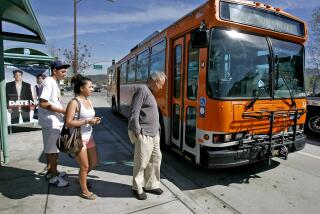RTD Audit Finds Costly, ‘Alarming’ Absenteeism Rate
- Share via
Absenteeism among Southern California Rapid Transit District bus drivers is higher than comparable systems in New York, Chicago and Washington, and the extent and cost of the problem has been understated, according to a new audit of the huge agency.
The average RTD bus operator is unavailable for driving duties nearly 36 days each year, excluding vacations, holidays and regular days off. That rate is 30% higher than previously reported, says the study prepared for the Los Angeles County Transportation Commission, which oversees a large share of RTD’s funding.
The lost time costs the agency an estimated $16.3 million a year, and reducing RTD’s absenteeism to rates experienced by other large transit agencies would save up to $3.8 million a year, according to the management audit done by the Price Waterhouse consulting firm.
‘No Tangible Improvement’
Absenteeism among RTD’s 5,000 drivers was emphasized in a similar commission audit three years ago, but the new report says that despite a series of RTD efforts, “there has been no tangible improvement in performance to date.”
The findings “are very alarming,” Los Angeles County Supervisor Deane Dana, chairman of the transportation commission, said Monday. “There’s something wrong in the operation, no question about it.”
The commission, which received the absenteeism report several weeks ago, is awaiting completion of a follow-up report on the nature of RTD’s absenteeism problems and how they should be addressed.
The report comes at a time when the RTD is stepping up efforts to reduce drug abuse among drivers, following two recent accidents that injured 43 riders and involved drivers found to have drugs in their systems. Fred Pshyk, a principal with San Francisco-based Price Waterhouse, said there has been speculation that the absenteeism and drug abuse problems may be related. But, he said, “we were not able to substantiate” a link.
A Major Problem
RTD officials admit absenteeism is a major problem and insist that they have been working hard to reduce it. Those efforts have chiefly focused on incentive programs, such as awarding savings bonds, pins and patches for good attendance.
But RTD officials say the contract with the drivers’ union makes the task difficult.
John Richeson, RTD assistant general manager, said procedures for controlling absenteeism are subject to contract negotiations, and “we have not been able to negotiate a change in the contract that is able to solve the problem.”
For example, the agency has unsuccessfully sought to change the contract to permit disciplining of drivers who are absent six days in six months, he said. Drivers can now be absent up to six days in three months before they are penalized, Richeson said.
RTD drivers, some of whom make more than $29,000 a year and are among the highest paid in the country, argued that overwork and stress contribute to absenteeism, and the solution is to hire more drivers and expand service. A spokesman for the United Transportation Union, which represents district drivers, said union officials had not yet analyzed the report. But Goldy Norton, a union public relations representative, said absenteeism may be high because service has “been in a state of decline” and “the one person that suffers more than anyone else is the poor person behind the wheel.”
Extensive Audit
The new estimates on absenteeism are part of an extensive management audit that the transportation commission is required by state law to perform on each transit operator in the county every three years.
Auditors reviewing 1985 records found that the absenteeism rate had been understated in previous reports because weekend driver absences were not included. RTD officials said they had not counted weekend absences because it did not conform to the format of data sought by most agencies, such as the American Public Transit Assn. and the state.
In addition, officials said tracking absenteeism has been difficult because reports are gathered by hand. A new automated records system will permit better tracking and evaluation of absenteeism, they said.
The audit report found that of the 36 days the average driver was absent each year--23 were for sickness or injury. The rest were unexcused absences, requested days off for personal emergencies and suspensions.
The report also notes that American Public Transit Assn. reports show that RTD has a significantly higher absenteeism rate than New York, Washington and Chicago transit systems, with which it is most comparable in size, service and budget.
One report shows that on a typical weekday, 11.5% of RTD’s drivers were absent, contrasted with about 8% for the other three systems. Of the large West Coast transit systems, only the Alameda-Contra Costa Transit District was higher.
Terry Bronson, a transit association labor information specialist, said the estimate of absenteeism among RTD drivers “sounds absurdly high.”
He noted, however, that California transit systems have a generally higher absenteeism rate than systems elsewhere in the country.
“I can’t think of any logical explanation other than the weather is nice and the guys like to take off,” he said.
$4.2 Million Annually
The audit found that in percentage terms, lost time among drivers represents about 16.2% of the standard 260-day work year.
The report also found no improvement in absenteeism among bus maintenance workers, calling it “an area of significant concern” that costs $4.2 million annually.
The audit praises the RTD for its progress on improving performance in areas other than absenteeism, but also notes a dramatic increase in disability payments since the 1982 audit. Workers Compensation payments rose from $10 million in 1982 to $19 million last year. While disability payment costs are not directly controlled by the district, the report says increases in disability payments exceeded wage increases in 1985, and says the increase should be a “major concern” to the district.
More to Read
Sign up for Essential California
The most important California stories and recommendations in your inbox every morning.
You may occasionally receive promotional content from the Los Angeles Times.













